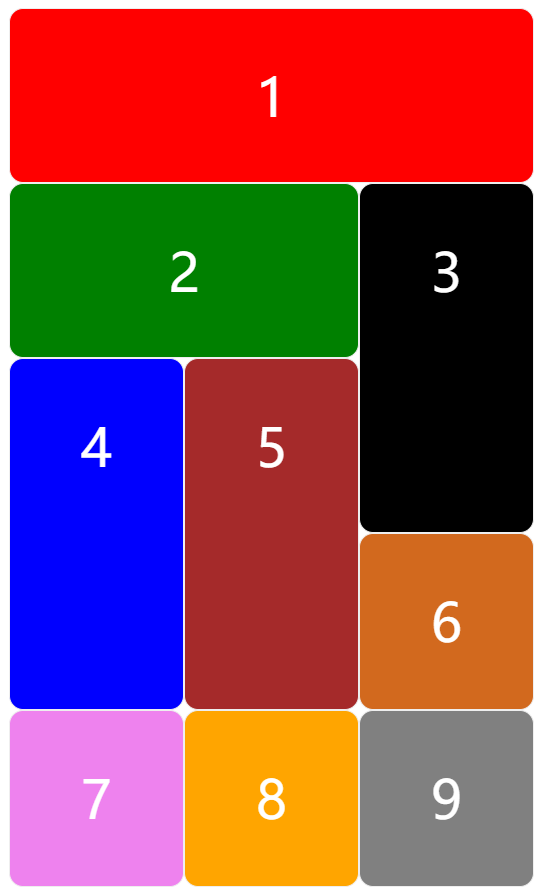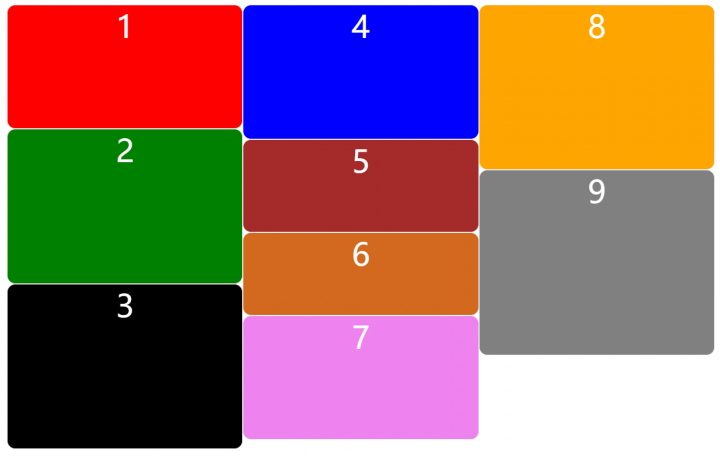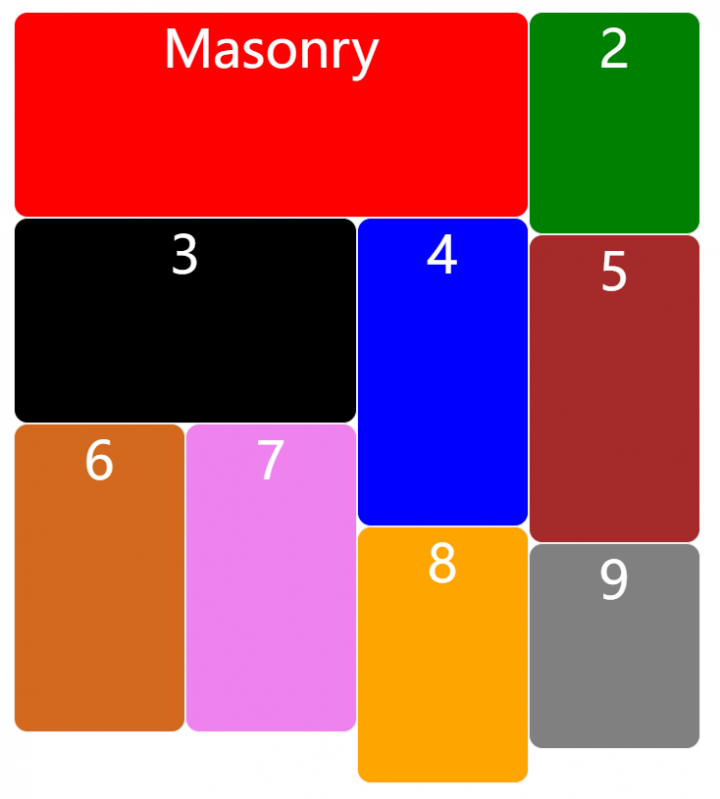Masonry 瀑布流 CSS VS JS
Masonry 是前端比较常见的布局方式,不同元素按照紧密填充的规则排列 —— 即下一行的元素会自动填补上一行留下的空白空间,形成错落有致、类似瀑布倾泻的视觉效果。
Grid 网格布局
Grid 更适合固定布局,定宽定高的情况,但是利用他的特性也能实现类似瀑布流的效果,但对于变宽变高的情况就明显支持不足,因为“网格”布局,每行每列的网格格子都是倾向于与前一个格子保持一致的,除非设置跨行跨列,这样其尺寸也是相对于格子来说规则地成倍变大,Grid 不适用无规则的变化。

<html>
<style>
.container {
display: grid;
grid-template-columns: repeat(3, 100px);
grid-template-rows: repeat(3, 100px);
grid-auto-flow: row dense;
}
.container div {
text-align: center;
line-height: 100px;
border: 1px solid #eee;
border-radius: 8px;
font-size: 30px;
}
</style>
<body>
<div class="container" style="color: white">
<div style="background: red; grid-column-start: span 3">1</div>
<div style="background: green; grid-column-start: span 2">2</div>
<div style="background: black; grid-row-start: span 2">3</div>
<div style="background: blue; grid-row-start: span 2">4</div>
<div style="background: brown; grid-row-start: span 2">5</div>
<div style="background: chocolate">6</div>
<div style="background: violet">7</div>
<div style="background: orange">8</div>
<div style="background: gray">9</div>
</div>
</body>
</html>
Column 列布局
多列布局会将容器内的内容按照设定的列数或列宽分配到多列中,并试图自动平衡每列的高度,但视觉上并不是最平衡,从上到下,再从左到右填充内容,这种顺序是不可以更改的,这就带来了局限性,懒加载会引起重新布局,不支持跨列,响应式布局需要配合媒体查询,有可能会发生某个项在中间被截断到下一列,不能忘记写 break-inside: avoid;,所以其适用于宽度一致,高度动态可变,对顺序、排列、懒加载要求不高的场景。

<html>
<style>
.container {
column-count: 3;
column-gap: 0px;
}
.container div {
break-inside: avoid;
text-align: center;
border: 1px solid #eee;
border-radius: 8px;
font-size: 30px;
}
</style>
<body>
<div class="container" style="color: white">
<div style="background: red; height: 120px">1</div>
<div style="background: green; height: 150px">2</div>
<div style="background: black; height: 160px">3</div>
<div style="background: blue; height: 130px">4</div>
<div style="background: brown; height: 90px">5</div>
<div style="background: chocolate; height: 80px">6</div>
<div style="background: violet; height: 120px">7</div>
<div style="background: orange; height: 160px">8</div>
<div style="background: gray; height: 180px">9</div>
</div>
</body>
</html>
JS
开源项目 masonry 很好地利用 JS 实现了瀑布流布局,他基于 outlayer 作为基础布局创建了瀑布流布局,所以在学习源码的过程中,需要两个项目结合着阅读。以下是核心实现思路。

<html>
<style>
.container {
position: relative;
width: 400px;
padding: 10px;
color: white;
}
.container div {
box-sizing: border-box;
width: 100px;
text-align: center;
border: 1px solid #eee;
border-radius: 8px;
font-size: 30px;
}
</style>
<body>
<div class="container">
<div style="background: red; height: 120px; width: 300px">Masonry</div>
<div style="background: green; height: 130px">2</div>
<div style="background: black; height: 120px; width: 200px">3</div>
<div style="background: blue; height: 180px">4</div>
<div style="background: brown; height: 180px">5</div>
<div style="background: chocolate; height: 180px">6</div>
<div style="background: violet; height: 180px">7</div>
<div style="background: orange; height: 150px">8</div>
<div style="background: gray; height: 120px">9</div>
</div>
</body>
<script>
// 列表项构造函数
function Item(element, layout) {
this.element = element
this.layout = layout
this.position = {
x: 0,
y: 0,
}
this._create()
}
const itemProto = Item.prototype
itemProto.constructor = Item
itemProto._create = function() {
this.css({
position: 'absolute',
})
}
itemProto.css = function(style) {
const elemStyle = this.element.style
for (const prop in style) {
elemStyle[prop] = style[prop]
}
}
itemProto.getSize = function() {
this.size = getSize(this.element)
}
itemProto.goTo = function(x, y) {
this.setPosition(x, y)
this.layoutPosition()
}
itemProto.setPosition = function(x, y) {
this.position.x = parseFloat(x)
this.position.y = parseFloat(y)
}
itemProto.layoutPosition = function() {
const layoutSize = this.layout.size
const style = {}
// x
const xPadding = 'paddingLeft'
const xProperty = 'left'
const x = this.position.x + layoutSize[ xPadding ]
style[ xProperty ] = x + 'px'
// y
const yPadding = 'paddingTop'
const yProperty = 'top'
const y = this.position.y + layoutSize[ yPadding ]
style[ yProperty ] = y + 'px'
this.css(style)
}
// 布局构造函数
function Layer(element, options = {}) {
const queryElement = document.querySelector(element) // 获取父节点
this.element = queryElement
this.size = {}
this.options = options
this.items = []
this._create()
}
const layerProto = Layer.prototype
layerProto.constructor = Layer
layerProto._create = function() {
const children = this.element.children
const items = []
// 收集子节点创建列表项实例
for (let i = 0; i < children.length; i++) {
const ele = children[i]
const item = new Item(ele, this)
items.push(item)
}
this.items = items
}
layerProto.layout = function() {
// 计算布局尺寸
this._resetLayout()
// 获取容器宽度
this.containerWidth = this.size.innerWidth
// 列宽
this.columnWidth = this.options.columnWidth ?? 0
// 间距
this.gutter = this.options.gutter ?? 0
// 根据参数 columnWidth 或者首个元素的宽度计算列数
this.measureColumns()
this.colYs = []
for (let i = 0; i < this.cols; i++) {
this.colYs.push(0)
}
// 排布子元素
this.layoutItems()
}
layerProto._resetLayout = function() {
this.getSize()
}
layerProto.getSize = function() {
this.size = getSize(this.element)
}
layerProto.measureColumns = function() {
// 未设置列宽则获取首个元素的宽度,或者直接取容器宽度
if (!this.columnWidth) {
const firstItem = this.items[0]
const firstItemElem = firstItem && firstItem.element
this.columnWidth = firstItemElem && getSize(firstItemElem).outerWidth || this.containerWidth
}
const columnWidth = this.columnWidth += this.gutter
const containerWidth = this.containerWidth + this.gutter
let cols = containerWidth / columnWidth
const excess = columnWidth - (containerWidth % columnWidth)
var mathMethod = excess && excess < 1 ? 'round' : 'floor'
cols = Math[mathMethod](cols)
// 最终列数
this.cols = Math.max(cols, 1)
}
layerProto.layoutItems = function() {
const items = this.items
if (!items || !items.length) {
return
}
const queue = []
items.forEach(function(item) {
const position = this._getItemLayoutPosition(item)
position.item = item
queue.push(position)
}, this)
this._processLayoutQueue(queue)
}
layerProto._processLayoutQueue = function(queue) {
queue.forEach(function(obj, i) {
this._positionItem(obj.item, obj.x, obj.y);
}, this)
}
layerProto._positionItem = function(item, x, y) {
item.goTo(x, y)
}
layerProto._getItemLayoutPosition = function(item) {
item.getSize()
const remainder = item.size.outerWidth % this.columnWidth
const mathMethod = remainder && remainder < 1 ? 'round' : 'ceil'
let colSpan = Math[mathMethod](item.size.outerWidth / this.columnWidth)
colSpan = Math.min(colSpan, this.cols)
const colPosition = this._getTopColPosition(colSpan)
const position = {
x: this.columnWidth * colPosition.col,
y: colPosition.y
}
const setHeight = colPosition.y + item.size.outerHeight;
const setMax = colSpan + colPosition.col;
for (let i = colPosition.col; i < setMax; i++) {
this.colYs[i] = setHeight;
}
return position;
}
layerProto._getTopColPosition = function(colSpan) {
// 获取列组合,目的是从符合列宽条件的列组中获取最小的列
const colGroup = this._getColGroup(colSpan)
const minimumY = Math.min.apply(Math, colGroup)
return {
col: colGroup.indexOf(minimumY),
y: minimumY,
}
}
layerProto._getColGroup = function(colSpan) {
if (colSpan < 2) {
return this.colYs
}
const colGroup = []
// 第一组:第 0 列 ~ 第 (colSpan-1) 列
// 第二组:第 1 列 ~ 第 (colSpan) 列
// ...
// 最后一组:第 (this.cols - colSpan) 列 ~ 第 (this.cols - 1) 列
// 因此组合的数量是 this.cols - colSpan + 1
const groupCount = this.cols + 1 - colSpan
for (let i = 0; i < groupCount; i++) {
colGroup[i] = this._getColGroupY(i, colSpan);
}
return colGroup
}
layerProto._getColGroupY = function(col, colSpan) {
if (colSpan < 2) {
return this.colYs[col];
}
const groupColYs = this.colYs.slice(col, col + colSpan)
return Math.max.apply(Math, groupColYs)
}
// 获取元素尺寸
function getSize(element) {
const measurements = [
'paddingLeft',
'paddingRight',
'paddingTop',
'paddingBottom',
'marginLeft',
'marginRight',
'marginTop',
'marginBottom',
'borderLeftWidth',
'borderRightWidth',
'borderTopWidth',
'borderBottomWidth',
]
const style = getComputedStyle(element)
const size = {}
size.width = element.offsetWidth
size.height = element.offsetHeight
const isBorderBox = size.isBorderBox = style.boxSizing == 'border-box'
measurements.forEach(measurement => {
const value = style[measurement]
const num = parseFloat(value)
size[measurement] = !isNaN(num) ? num : 0
})
const paddingWidth = size.paddingLeft + size.paddingRight
const paddingHeight = size.paddingTop + size.paddingBottom
const marginWidth = size.marginLeft + size.marginRight
const marginHeight = size.marginTop + size.marginBottom
const borderWidth = size.borderLeftWidth + size.borderRightWidth
const borderHeight = size.borderTopWidth + size.borderBottomWidth
const styleWidth = getStyleSize(style.width)
if (styleWidth !== false) {
size.width = styleWidth + (isBorderBox ? 0 : paddingWidth + borderWidth)
}
const styleHeight = getStyleSize(style.height)
if (styleHeight !== false) {
size.height = styleHeight + (isBorderBox ? 0 : paddingHeight + borderHeight)
}
size.innerWidth = size.width - (paddingWidth + borderWidth)
size.innerHeight = size.height - (paddingHeight + borderHeight)
size.outerWidth = size.width + marginWidth
size.outerHeight = size.height + marginHeight
return size
}
function getStyleSize(value) {
let num = parseFloat(value)
let isValid = value.indexOf('%') == -1 && !isNaN(num)
return isValid && num
}
const layout = new Layer(
'.container',
{ columnWidth: 100 }
)
layout.layout()
</script>
</html>
如果涉及动态内容、复杂排序、精确布局控制或交互需求,JS 实现是更优选择。
